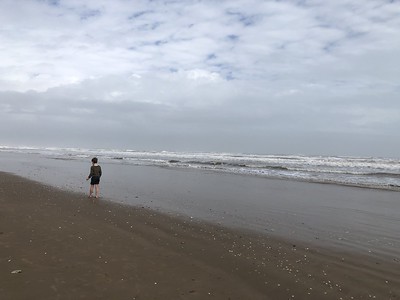Friday Read | Disconnecting & Social Media
Why is the US So Susceptible to Social Media Distortion? via the New Yorker.
Sarah from the Pantsuit Politics podcast mentioned this article in their episode today–and it is a good episode to listen to because they talk about this issue as well as a variety of other pertinent topics from this week. As I read this article it reminded me of the pre-social media email forwarding/chain emails that used to be so prevalent—this was how memes and ‘fake news’ was shared back in the day. It just morphed into a larger platform with social media.
I have thought time and time again how glad I was to have been off of Facebook during the election, having quit in the spring of 2015. I’ve been tempted to go back a few times because it would be easier to get on some local mom groups to sell baby items and because I do miss some updates from friends, but I’ve been reminded how much better off I have been not to have been subjected to the crap that was put into Facebook over the last several years. The times I’ve read over Chris’ shoulder at something I have been utterly dismayed at some of the things people I know have been sharing. It made me glad that I wasn’t seeing that side of them on a daily basis because I’m not sure I would be able to have stayed friends with them on the Book of Faces. I’m also reminded about what role Facebook played in this election (as well as Twitter) and that also deters me in wanting to return. Pod Save America covers this today on their episode, starting around the 38 minute mark.
I only recently quit Twitter as well and I was rather sad to do so. For the longest time during the campaign/election, it felt like a bit of a beacon of hope, getting news straight from journalists and investigative reporters but over time it turned into a massive dumpster fire. I nearly left last spring after I was bombarded by trolls, real and otherwise, after I quote retweeted my reply to a journalist’s article about the potential loss of grants funded by the EPA during those first few weeks of T’s being in office.
I mentioned, thinking that I was really just tweeting to the people following my feed, that I’d had a previous job that had been funded by an EPA grant and was worried about the ramifications for that grant being taken away. Well, said journalist then retweeted my quote to her followers and I had never seen that many likes or retweets or comments to any of my tweets before. It started off innocuous but quickly ballooned out of control to the point I started blocking people. A couple of people who replied me seemed like genuine humans, but they were far right-wing and you could tell no amount of actual clarification would assuage their fears of Big Bad Government funding someone’s job. Others I could tell were bots. It got to the point where I locked my account and deleted the tweet. I laid low for awhile after and honestly didn’t quite recover from it. Twitter was a huge turn off for me after that and I finally had enough this summer. I do miss being on there, keeping in touch with a few people, but it also feels much healthier taking myself out of the rage cycle and instead choosing to find good news sources to stay informed.
Sidenote: Not that I consider Yahoo!’s front page a good news source, have you seen it lately? It’s gone seriously downhill since they were bought by Verizon and I’ve seen what look like legitimate headlines by Yahoo! News itself turn out to be completely misleading. That doesn’t even consider the amount of ‘articles’ in their lineup that lead to crap websites. So, say you are Mrs. Jones checking her email, you probably think Yahoo! is supposed to be a fairly truthworthy source to read something, and if you glance at a headline without reading the rest of the article, you might well believe that Michelle Obama assaulted someone. Yeah, I read that one yesterday. It seemed really real at first…until you read the article and realized it was a huge click-bait and was a total spin on not a story of Mrs. Obama assaulting someone. Very dubious and shoddy ‘journalism’. I’m afraid of *that* becoming more common.
Which brings me to a couple of quotes from the article at the top:
The Trump-Putin breed of celebrity authoritarianism operates on a crude double strategy—control the media you can, muddy the rest. The Russian disinformation campaigns are based not just on promoting the viewpoints that it wants promoted but by destabilizing entire systems of meaning.
The parameters of social-media conflict are difficult to grasp because Facebook posts seem irrelevant when compared to war or geopolitics—one is an online amusement, diversion, and sometime news source, while the other is life and death. But Marshall McLuhan predicted that the Third World War would be “a guerrilla information war with no division between military and civilian participation,” and that’s exactly what it has turned out to be. America seems more vulnerable than other developed countries to the kind of distortion that Facebook and Twitter bring to news and politics. Arguably, the social-media distortion affects America more profoundly than other countries because of the very specific, even unique, way that Americans make meaning. This gullibility is a consequence of the country’s ancient faith in self-determination as an all-encompassing guiding principle.
What’s being made abundantly clear is that even if you think you aren’t being swayed by some meme or ad on social media, constantly seeing something puts that inkling of doubt into your head. It’s probably also why people are so quick to use false equivalence (and its sibling “both siderism”) when trying to shift around blame, too. The real problem is how all of this is being used by a foreign government to infiltrate and disrupt another government, ours.
I guess, all of this has been building in my mind anyway, this need to slowly un-tether myself from various social medias, loosen the ties to my smart phone (I don’t have many apps on it, try to not use it all when I’m around a computer and can look things up on that, keep my phone on silent/vibrate, no notifications, keep my phone in my purse, etc etc.) and be a little bit more conscious. There are plenty of articles and research you can find showing the affects smartphones have on our brains—and that doesn’t even count what social media has done.
One final article by writer Cal Newport, Are you using social media or being used by it?
Just me here, thinking about the broader societal issues we’ve got these days.



2 Comments
chel
Yes yes yes!!! all of this, yes!
For a few weeks after Irma I “peeked” in on Facebook to look at weather stuff (to eavesdrop on the chatter of meteroeologoists when nate was starting to show up on the weather models) using Grace’s old and forgotten Facebook account, and even though I went directly to specific posts linked on weather blogs, I still got bombareded by junk by Facebook. I just don’t want any part of it.
One thing that I’ve really gotten irritated with is how social media is now a *required* part of friendship. I haven’t heard from most of my friends since I left Facebook- I’m fairly sure they know I have a blog and a phone (to text on) and can keep up with me there, but every so often I get a PM on Instagram asking me to please come back. That’s lovely, but I didn’t *go* anywhere. I just de-activated my Facebook account. This is one of the reasons I am really resentful of Facebook- it’s turned into the heart of the internet. And it’s full of ignorance because it’s too freaking easy to share things on there and have them go viral.
It reminds me of the early 90’s, when AOL went from being a closed network and was connected to rest of the internet (which was mostly universities, privately run forums, science institutions, etc.). Literally overnight the internet became chaotic. Usenet, IRC were all sort of populated by sane people of many different opinions who were amiable to one another simply because we knew how to get online, so that sort of bonded us. Then overnight, it just exploded and it never was the same.
I also think social media enables people with profound paranoia to connect with one another and not get the help they need. It’s rare to find someone who doesn’t believe that Sandy Hook happened in a single town, but that one guy gets online and finds 200,000 other people who have the same paranoia (and the trolls who sarcastically post along with them, but it’s interpreted as support…) and suddenly it’s a real thing with YouTube channels and politicians involved. And all the sudden something that was just a figment of someone’s fear becomes a a tanglible and influential possibility to many people who don’t understand that just because something *looks* like news on Facebook doesn’t mean it is.
TRUE example: there are many people on Marco Island who believe that Hurricane Irma was caused by the eclipse because there was some pseudo-science/religious nut story being shared on local Facebook pages. I am SERIOUS. When that rumor went around, I literally wanted to weep. It still makes me a bit dizzy to think about that.
How far can it go?
Rosemarie
I’m starting to get tired of Facebook commercials, it feels like television all over again. I am attempting to not use it on my phone